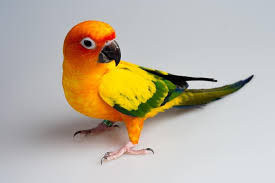
Conure
Conditions of detention
Conures require a spacious cage that allows for ample movement and play. The cage should have horizontal bars for climbing, and it’s important to include perches, toys, and various enrichment activities to keep them mentally stimulated. Place the cage in a well-lit area away from drafts and direct sunlight, as conures thrive in stable environments.
Useful Fact: Conures benefit from spending time outside of their cage each day under supervision to exercise, explore, and interact with their human companions.
Nutrition and diet
A balanced diet for conures includes high-quality pellets, fresh fruits, vegetables, nuts, and seeds. Leafy greens, carrots, apples, and berries provide essential vitamins and nutrients. Nuts like almonds and walnuts can be offered as occasional treats due to their high-fat content.
Useful Fact: It’s important to avoid feeding conures chocolate, caffeine, avocado, and alcohol, as these can be toxic to them.
Health
Conures are generally healthy birds but can be prone to certain health issues such as respiratory infections, feather plucking, and obesity. Regular veterinary check-ups and a balanced diet are crucial for maintaining their health.
Useful Fact: Monitor your conure’s droppings, as changes in color or consistency can indicate health issues that require attention.
Grooming and care
Conures require regular grooming, including nail trimming and bathing to maintain feather health. They often enjoy bathing in shallow dishes or being misted with water.
Useful Fact: Providing cuttlebone or mineral blocks can help keep their beaks trimmed and provide essential minerals.
Education and training
Conures are intelligent and can be trained to perform tricks, solve puzzles, and mimic sounds. Positive reinforcement techniques work best, and training provides mental stimulation and helps reinforce good behavior.
Useful Fact: Keep training sessions short (10-15 minutes) and consistent to maintain your conure’s interest and reinforce learning.
Toys and entertainment
Toys are essential for keeping conures entertained and mentally stimulated. They enjoy a variety of toys, including puzzle toys, foraging toys, and toys that encourage chewing and manipulation.
Useful Fact: Rotate toys regularly to maintain interest and prevent boredom, which can lead to destructive behaviors.
Safety
Ensure the living environment is free from hazards such as toxic plants, fumes from non-stick cookware, and small objects that could be ingested. The cage should be secure with appropriate bar spacing to prevent escape.
Useful Fact: Conures are curious and may chew on electrical cords, so keep cords out of reach to prevent accidents.
Accessories
Essential accessories include sturdy perches, food and water dishes, and a variety of toys. Natural wood perches of varying diameters are beneficial for foot health.
Useful Fact: Using perches made of different materials can help prevent pressure sores on the feet and provide exercise for the conure’s muscles.
Socialization
Conures require significant social interaction to thrive. They form strong bonds with their human companions and can become lonely or depressed if left alone for extended periods.
Useful Fact: Spending quality time with your conure daily, including talking and playing, helps meet their social needs and strengthens your bond.
Travel and Transportation
When traveling, use a secure and well-ventilated travel cage. Acclimate your conure to the travel carrier before trips to reduce stress.
Useful Fact: Cover the travel cage with a light cloth during transport to minimize stress and provide a sense of security.
Behavior and psychology
Conures are intelligent and can exhibit complex behaviors. Understanding their body language and vocalizations is crucial for effective communication and care.
Useful Fact: Conures are known for their playful and social nature, often seeking attention and interaction with their owners.
Legal aspects
In most areas, there are few legal restrictions on keeping conures as pets, but it is important to ensure that any conures purchased are from reputable breeders or pet stores and not taken from the wild.
Useful Fact: Always check local regulations to ensure compliance with laws regarding pet ownership and breeding.


